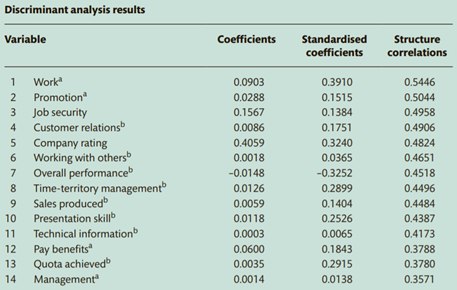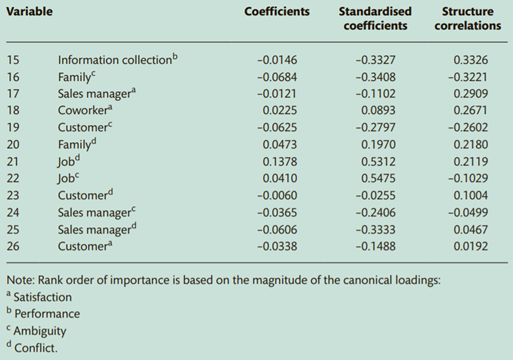solution
Satisfied salespeople stay
A survey asked business people about the climate of hiring and maintaining employees in harsh economic conditions. It was reported that 85% of participants were concerned about recruiting employees and 81% said they were concerned about retaining employees. When the economy is down, turnover is rapid. Generally speaking, if an organisation wants to retain its employees, it must learn why people leave their jobs and why others stay and are satisfied with their jobs. Discriminant analysis was used to determine what factors explained the differences between salespeople who left a large computer manufacturing company and those who stayed. The independent variables were company rating, job security, seven job satisfaction dimensions, four role-conflict dimensions, four role-ambiguity dimensions and nine measures of sales performance. The dependent variable was the dichotomy between those who stayed and those who left. The canonical correlation, an index of discrimination (![]()  = 0.4572), was significant (Wilks’
 = 0.4572), was significant (Wilks’ ![]()  = 0.7909, F26,173 = 1.7588,
Ă‚Â = 0.7909, F26,173 = 1.7588, ![]() Ă‚Â = 0.0180). This result indicated that the variables discriminated between those who left and those who stayed.
Ă‚Â = 0.0180). This result indicated that the variables discriminated between those who left and those who stayed.


The results from simultaneously entering all variables in discriminant analysis are presented in the table above. The rank order of importance, as determined by the relative magnitude of the canonical loadings, is presented in the first column. Satisfaction with the job and promotional opportunities were the two most important discriminators, followed by job security. Those who stayed in the company found the job to be more exciting, satisfying, challenging and interesting than those who left.
"Looking for a Similar Assignment? Get Expert Help at an Amazing Discount!"


